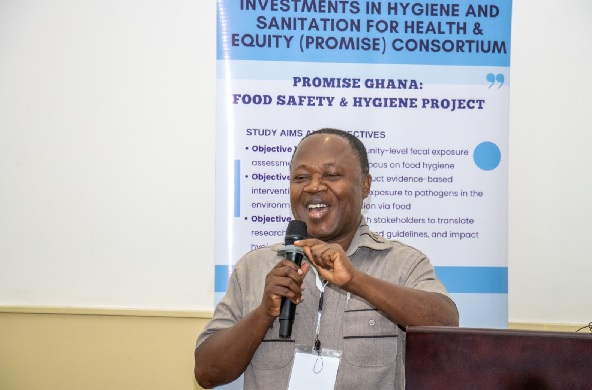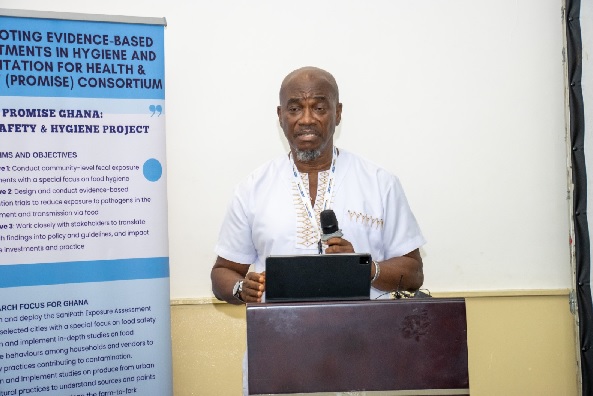As sanitation issues grow increasingly complex, the need for deep knowledge and the effective use of robust decision-support tools has become critical for ensuring that policies and interventions are inclusive, efficient, and sustainable, the Managing Director of the Training, Research and Network for Development (TREND) Group, Eugene Larbi has emphasized.
Mr Larbi made these remarks during his welcome address at the 2nd Annual Meeting of the Promoting Evidence-Based Investments in Hygiene and Sanitation for Health & Equity (PROMISE) Consortium Network, held in Accra on Monday, April 7, 2025.
The week-long workshop brought together participants from across Africa, South Asia, and the United States to engage in knowledge exchange and collaborative learning.
Highlighting the significance of the event, Mr Larbi noted that this year’s meeting builds on the strong foundation laid during last year’s gathering in Kampala and marks a key milestone for the PROMISE Consortium.
“We are at the midpoint of the Initiative — that means it is time to reflect, challenge assumptions, share experiences honestly, and align around a clearer path forward,” he said.
Mr Larbi also emphasized the importance of the workshop’s theme, “Strengthening Evidence-Based Decision-Making in WASH Using Decision-Support Tools,” which he said reflects a renewed commitment to innovation, cross-country collaboration, and shared learning.
He encouraged participants to use the opportunity to push the initiative’s mission forward by “turning evidence into policy, strengthening country-led ownership of solutions, and ensuring approaches are practical, inclusive, and future-ready.”
Ghana's journey with PROMISE
Mr Larbi also reflected on Ghana’s active involvement in the PROMISE Initiative, highlighting TREND’s ongoing efforts and impactful collaborations.
He noted the organization's partnership with Emory University in the development and implementation of the SaniPath Tool—an evidence-based approach to assessing sanitation-related health risks.
![]()
“This collaboration led to TREND being established as a regional training hub for the promotion of the tool in 2018. We take pride in the role we’ve played in building regional capacity for sanitation risk assessment,” Mr Larbi stated.
He further explained that TREND’s current focus under the PROMISE Initiative is on food hygiene and safety, with a particular emphasis on tracking exposure to contamination along the entire food chain—from farm to fork.
“We’re working in four municipalities to identify faecal contamination pathways, assess associated risks, and pilot practical interventions—including a colour-coded vendor rating system,” he explained.
"Through these efforts, TREND aims to influence stronger policy development, enable more targeted interventions, and enhance training programmes for sanitation and hygiene professionals across the region." he added.
The PROMISE Consortium is a global initiative supported by the Bill and Melinda Gates Foundation and the Reckitt Global Hygiene Institute, involving countries such as Ghana, Kenya, Zambia, Tanzania, Uganda, Senegal, and Bangladesh.
The consortium works with governments and academic institutions, including Emory University and the University of North Carolina at Chapel Hill, in the USA to improve decision-making on sanitation investments in participating countries using scientific tools and data.
Bridging gaps
Head, Environmental Health and Management Unit of the Ministry of Local Government, Chieftaicy and Religious Affairs, Mr Kweku Quansah mentioned that Ghana had made significant gains in the sanitation and Hygiene sectors, but there remain critical gaps that require urgent attention to bridge.
"WASH in HCFs, WASH in Schools, Food Hygiene and Safety, which is the priority focus areas under the PROMISE Project, continue to face challenges at both policy and impplementation levels," he said.
"The increasing incidence of foodborne diseases and inadequate WASH challenges in our markets, street food vending spaces and along the food production chain as well as in our hospitals and schools, highlight the need for stronger regulations, enhanced monitoring and increased investments," Mr Quansah stated.

He emphasized that the best way to ensure food hygiene, safety and improved WASH facilities in health care and educational institutions is a shared responsibility among policy makers, local authorities, care giers, service providers, regulators, researchers and development partners.
"This is the way to go if we are to achieve our national and international development targets. This workshop presents a unique opportunity for us to engage in technical discussions, undertake field visits and planning sessions that will influence the future of WASH programming in our various countries," he stressed.
"The insights and recommendations that will emerge from this forum will help strengthen our national policies," he added.
Alignment with sanitation trends
Delivering the keynote address, Country Director of IRC Ghana, Vida Duti called on stakeholders to align their efforts with current sanitation trends in order to provide relevant and impactful solutions that support government policies.
“Looking at the direction government is taking, we need to stay in step with emerging trends. If we can't justify the solutions we're proposing within the context of new policy thinking, it could become a challenge,” she stated.
She further emphasized the importance of evidence-based advocacy: “If we are to engage government effectively, we must build and scale institutionalized research that can inform policy. As we carry out our technical work, we must ensure it is packaged in a way that encourages its adoption and use by decision-makers.”
Other speakers at the opening session were Director, Centre for Global Safe Water, Sanitation and Hygiene at Emory University, Prof. Christine L Moe, Director Metro Public Health Department, Accra Metropolitan Assembly, Florence S Kuukyi and Jamie Nunn of Reckitt Global Hygiene Institute.
The event was moderated by Chief Executive Officer of SkyFox Limited, Patrick Apoya.

